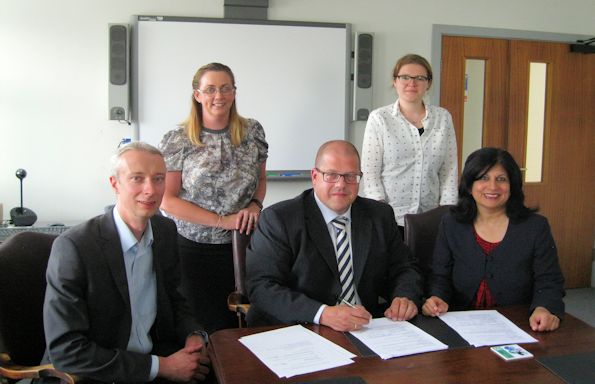University awarded £700k collaborative funding to develop antimicrobial coatings

The University’s Open Innovation Hub for Antimicrobial Surfaces is launching a £700K collaborative research project, funded by Innovate UK, to develop advanced antimicrobial coatings to control and prevent biofilm formation.
Working in partnership with multinational speciality chemicals company, Croda Ltd, and UK SME, Scanwel Ltd, the project will provide advanced characterisation tools to optimise new anti-biofilm technology, developed by Croda, and take this forward in a number of market sectors.
A biofilm is formed when microorganisms, such as bacteria, attach to a surface and proliferate. Biofilms cost the UK economy billions of pounds in damage per annum and are implicated in 65% of all infections.
Erwin Honcoop, Research and Technology Specialist at Croda, said: “Croda is excited to get more in-depth knowledge on bacterial interaction with a newly developed antimicrobial technology and the surfaces it is applied upon.
"The expertise of the University on advanced surface characterisation and new analytical equipment of Scanwel form a good combination to tackle the challenges.”
Rupert Smith, Product Manager with Scanwel, said: “Scanwel is excited to participate with University of Liverpool and Croda in the project. It will give us the opportunity to broaden the range of proven applications for the AFM-IR analytical technique and will assist us to grow our sales of these instruments in the future”
Professor Rasmita Raval, Director of the Open Innovation Hub for Antimicrobial Surfaces and the University’s Surface Science Research Centre, said: “We are very happy to welcome Croda and Scanwel to the Open Innovation Hub for Antimicrobial Surfaces. We continue to build a vibrant network of companies and researchers developing new technologies, products and IP contributing to the battle against damaging biofilms in industry and healthcare applications”.
The Open Innovation Hub for Antimicrobial Surfaces, based in the Department of Chemistry, was set up to design and develop new processes and technologies to tackle the spread of microbial activity on surfaces.
It has a strong track record of working with world leading multinational companies and innovative SMEs in a broad range of industrial sectors including marine paints, healthcare, medical devices, consumer products and regional companies. It currently has a portfolio of collaborative projects totalling more than £6M.
The Open Innovation Hub for Antimicrobial Surfaces is supported by the European Regional Development Fund, the Engineering and Physical Science Research Council, Biotechnology and Biological Sciences Research Council and Innovate UK.